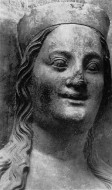Elizabeth of Pomerania
This article includes a list of general references, but it remains largely unverified because it lacks sufficient corresponding inline citations. (February 2013) |
| Elizabeth of Pomerania | |
|---|---|
 Elisabeth of Pomerania | |
| Holy Roman Empress Queen consort of Germany and Bohemia | |
| Tenure | 1363–1378 |
| Born | 1347 |
| Died | 15 April 1393 (aged 45–46) Hradec Králové |
| Burial | |
| Spouse | |
| Issue | |
| House | Pomerania |
| Father | Bogislaw V, Duke of Pomerania |
| Mother | Elisabeth of Poland |
Elizabeth of Pomerania (Polish: Elżbieta pomorska, Czech: Eliška Pomořanská; c. 1347 – 15 April 1393) was the fourth and final wife of Charles IV, Holy Roman Emperor and King of Bohemia. Her parents were Bogislaw V, Duke of Pomerania, and Elisabeth of Poland. Her maternal grandparents were Casimir III, King of Poland, and Aldona of Lithuania.
Marriage[]
The marriage of Charles and Elisabeth was held on 21 May 1363 in Kraków, only one year after the death of Charles's third wife, Anne of Schweidnitz. The bride was 16 years old, while the groom was 47. Charles married Elisabeth mainly for diplomatic reason, as the marriage helped to break the anti-Czech coalition led by Rudolf IV, Duke of Austria, with Polish and Hungarian kings as participants. On 18 June 1363 in the Bohemian capital Prague, Elisabeth was crowned Queen of Bohemia and 5 years later, on 1 November 1368, she was also crowned empress of the Holy Roman Empire in Rome by Pope Urban V.
She bore eight children:
- Anne of Bohemia (1366–1394), who was married to Richard II of England;
- Sigismund (1368–1437), the Holy Roman Emperor and King of Bohemia and Hungary;
- John (1369 – 23 July 1385);
- John of Görlitz (1370–1396), margrave of Moravia and duke of Görlitz, who married Richardis Catherine of Sweden;
- Charles (13 March 1372 – 24 July 1373);
- Margaret of Bohemia (1373–1410), who was married to John III, Burgrave of Nuremberg;
- Mary (1375 – 24 July 1385);
- Henry (1377–1378).
Queen and empress[]
Elisabeth is reputed to have been a very vigorous, self-confident and physically strong person. The relationship between Elisabeth and Charles is described to have been good and harmonious. During the serious illness of Charles in 1371, Elisabeth made a miniature pilgrimage by walking on foot to the cathedral and offering gifts in a prayer to his health. Their good relationship has been portrayed in art, such as in Noc na Karlštejně (A Night at Karlstein). She does not seem to have wielded any political influence, however: she was tormented by the fact that Charles preferred his children from his former marriage, but was unable to change his mind.
Widowhood[]
After her husband's death at 29 November 1378 in Prague, Elizabeth's stepson Wenceslaus IV, son of Charles's previous wife, ascended the throne. Elisabeth then cared for her own two sons, mainly the older Sigismund, whom she supported in his efforts to become the king of Hungary.
Elisabeth outlived Charles IV by 15 years. She died on 15 February 1393 in Hradec Králové (Königgrätz) and was buried next to her husband in St. Vitus Cathedral.[1]
References[]
- ^ Joachim Zdrenka: Elżbieta córka Bogusława V księcia pomorskiego, żona cesarza Karola IV Śląski Kwartalnik Historyczny Sobótka 1977, 1, p. 3.
- J. Fidler, České královny [Queens of Bohemia] (Havlíčkův Brod, 2004)
- KAVKA, František. Čtyři ženy Karla IV. Královské sňatky. Praha ; Litomyšl : Paseka, 2002. 189 s. ISBN 80-7185-493-X.
- SPĚVÁČEK, Jiří. Karel IV. Život a dílo (1316–1378). Praha : Nakladatelství Svoboda, 1980. 721 s.
- SPĚVÁČEK, Jiří. Václav IV. 1361–1419. K předpokladům husitské revoluce. Praha : Nakladatelství Svoboda, 1986. 773 s.
- 1347 births
- 1393 deaths
- Medieval Polish nobility
- Holy Roman Empresses
- Italian queens consort
- Wives of Charles IV, Holy Roman Emperor
- 14th-century Polish people
- 14th-century Polish women
- 14th-century women of the Holy Roman Empire
- 14th-century German women
